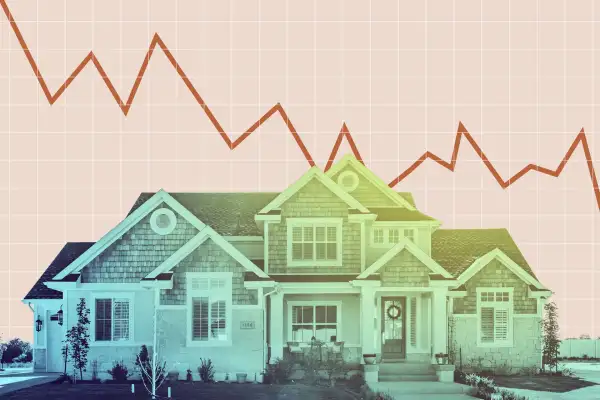Today's Best Mortgage and Refinance Rates: November 24, 2020 | Rates Rise Slightly

The share of borrowers deferring mortgage payments increased for the first time since June. Meanwhile, mortgage rates rose from yesterday.
Today's Mortgage Rates
The average rate for a 30-year fixed-rate purchase mortgage was 3.412% on Monday.
Money's mortgage rates include data from over 8,000 lenders across the United States and are updated daily. These rates include discount points and represent what a borrower with a 20% down payment and 700 credit scores — roughly the national average FICO score — would have been quoted.
| Mortgage Rates for November 24, 2020 |
| Loan type | Average Rate |
| 30-Year Fixed Loan | 3.412% |
| 15-Year Fixed Loan | 2.427% |
| 30-Year FHA Loan | 3.565% |
| 30-Year VA Loan | 3.561% |
| 30-Year Jumbo Loan | 3.727% |
Source: Money | Date: Nov. 23, 2020 | Rates assume a credit score of 700
How does someone qualify for the best mortgage rates?
Mortgage rates vary from state to state. On Monday, borrowers in West Virginia with 700 credit were quoted the lowest mortgage rates — at 3.151%. People looking for mortgages in Mississippi saw the highest average rate at 3.875%.
Nationwide, borrowers with the highest credit scores, 740 and above, were quoted rates averaging 2.931%, while those with credit of 620 or below were shown rates of 4.811% — a 1.88 percentage-point spread.
You may be able to negotiate a lower rate if you shop around or if you have other accounts with the lender. (Money's picks for the best mortgage lenders are here.) Currently, some lenders are hiking up advertised rates to keep demand in check, so you may be offered a lower rate if you reach out directly.
Freddie Mac's widely quoted Primary Mortgage Market Survey put rates at 2.72% with 0.7 points paid for the week ending November 19, a 0.12 percentage point drop from last week's 2.84% and the 13th record low set this year. The mortgage purchaser's weekly survey reflects borrowers who put 20% down on conforming loans and have excellent credit.
Today's Mortgage Refinance Rates
Money's survey also shows that the offered rate for a 30-year refinance for someone with a 740 credit score was 3.358% on Monday. Last November, the average mortgage rate (including fees) was 3.874%.
| Refinance Rates for November 24, 2020 |
| Loan type | Average Rate |
| 30-Year Fixed Loan | 3.358% |
| 15-Year Fixed Loan | 2.784% |
| 30-Year FHA Loan | 3.638% |
| 30-Year VA Loan | 3.644% |
| 30-Year Jumbo Loan | 3.56% |
Source: Money | Date: Nov. 23, 2020 | Rates Assume a Credit Score of 740
A homeowner with a $200,000 mortgage balance currently paying 3.874% on a 30-year could potentially cut their monthly payment from $940 to $692 by financing at the current lower rates. To determine if it's worth it to refinance your mortgage, also consider the closing fees you paid on your current mortgage, how much your new lender is charging and how long you have left on your loan term. (Our picks for the best lenders for refinancing are here).
What else is happening in the housing market today?
Approximately 2.7 million homeowners are in mortgage forbearance plans after the share of borrowers using the loan deferral program ticked up slightly to 5.48%, according to the Mortgage Bankers Association’s latest estimate. The increase, recorded during the week ending November 15, was the first since early June.
The option to pause mortgage payments without penalty was established as part of the Coronavirus Aid, Relief, and Economic Security Act passed by Congress in March. Lawmakers wanted to prevent people from losing their homes if they were having difficulty making on-time mortgage payments due to the pandemic.
At the peak in June, 4.3 million borrowers had opted into the plans — or 8.55% of mortgage borrowers.
Borrowers began to leave the program as parts of the economy reopened over the summer. Then there was a large jump in exits last month as many borrowers reached six-months in the program. Borrowers can remain in forbearance for up to a year, but need to contact their lender to renew the plan at the six-month mark. Currently, more than three-quarters of loans in forbearance are in the extension phase.
The recent increase is the result of a slowdown in forbearance exits, as well as a rise in the share of government-backed loans such as FHA and VA loans entering forbearance.
“Incoming housing market data remain quite strong, with existing-home sales in October reaching their fastest pace since 2005, and the inventory of homes on the market hitting a record low,” said Mike Fratantoni, chief economists at MBA, a trade organization. “However, renewed weakness in the latest job market data indicate that many homeowners are continuing to experience severe hardships due to the pandemic and still need the support that forbearance provides.”
Earlier this month, the Census Bureau estimated 3.8 million homeowners had no confidence in their ability to make upcoming mortgage payments. Surveys have also suggested that many homeowners are not aware that forbearance is an option.
Expert Mortgage Prediction of the Week
Expert views on what comes next.
All of the factors currently driving demand will continue to play out through the end of the year. Interest rates make it a great time to buy and low inventory makes it a great time to sell. That one-two punch will continue to influence a very active market."
— Kris Lindhal, CEO and founder of Kris Lindhal Real Estate, on whether home buyer demand will remain high. For more information on the housing market, read: Everyone Wants to Buy a House Right Now. 9 Experts Predict How Long demand Will Soar.
Bottom line:
The 10 Most Affordable Suburbs in America
Finding a Home Is so Hard Right Now That Buyers Are Scouring Obituaries and Divorce Notices
Lockdown Converted Many Americans Into Serious Savers. Now They Have Houses to Show for It
Rates are subject to change. All information provided here is accurate as of the publish date.
